|
Today we celebrate the memorial of St. Charles Borromeo, a scholar and theologian. He was instrumental in responding to the Protestant Reformation, and was named the Cardinal-Archbishop of Milan in 1564. Charles Borromeo has the distinction of being one of four saints mentioned in the Prologue to the Catechism of the Catholic Church, and he is mentioned as a significant force behind the products of the Council of Trent, which “initiated a remarkable organization of the Church’s catechesis” (CCC 9). In addition to working for the Catholic Apostolate Center, I work in the United States Conference of Catholic Bishops (USCCB) Secretariat for Evangelization and Catechesis. While the New Evangelization efforts have brought renewed use of Evangelization in the vocabulary of many Catholics, often we forget about the importance of catechesis.
There is no easy, succinct definition for catechesis. Rather, it is a process that is both interactive and ongoing. We tend to use it most when discussing the formation of catechumens, especially in the teaching of young children or through the RCIA process. The USCCB describes catechesis as “the act of handing on the Word of God intended to inform the faith community and candidates for initiation into the Church about the teachings of Christ, transmitted by the Apostles to the Church.” At some point in our faith formation, most of us have experienced catechesis. Whether it was the elementary school teachers who taught you in religion classes in Catholic schools, the religious education teachers through your parish CCD program, or RCIA formation leaders, we have all benefited from the important work that catechists do. Through their tireless dedication to teaching and spreading the faith, these men and women play an integral role in our Church. However, catechesis also takes place at a much more informal level as well. As the USCCB notes, “catechesis also involves the lifelong effort of forming people into witnesses to Christ and opening their hearts to the spiritual transformation given by the Holy Spirit.” Catechesis is an interactive process, not merely one person teaching another, but also involves a personal commitment to our own faith development. I know I have personally grown and developed in my faith through typical classroom learning, but also through life experiences. Catechesis takes both these forms. We never know the impact our words and actions can have on others, and perhaps your own experiences have helped someone else on their faith journey! Take a moment today to reflect on your own faith development and pray the prayer below, through the intercession of St. Charles Borromeo, for all those who have taken on the task of teaching our faith to others. Jesus, you told us that laborers for the vineyard would be few and that we should pray to the Lord of the Harvest in the hope that many might respond. You have answered our prayers by sending us catechists for your vineyard. Bless these men and women who have responded to your call to the ministry of catechesis. May they be filled with zeal for your Church, with care for those they catechize, and with love for your Word of Life. Let your Spirit come upon them so that your Word may echo through their teaching and through the witness of their lives. Through our catechists, may the members of our parish whom they teach be transformed into witnesses to your Word. And may these catechists receive the blessing your Son promised to all who labor in your vineyard. We pray to you, gracious Father, in the name of your Son, Jesus, the Word of Life, and in the unity of the Holy Spirit who transforms us by that Word, one God, forever and ever. Amen. **This post was originally published on 11/4/2014**
0 Comments
This coming Saturday, we will celebrate the Memorial of the Passion of St. John the Baptist. St. John the Baptist was the cousin of Jesus, and is most well-known for baptizing Christ in the Jordan River. The baptism of Jesus signaled the beginning of Jesus’ public ministry. Although this Saturday we will recall St. John the Baptist’s death, by recalling his ministry of Baptism we are given the opportunity to reflect on this important sacrament.
If someone mentions baptism, I’m sure the first image we all conjure is one of a small baby, clothed in a white gown, surrounded by their parents and godparents, getting baptized. Indeed, this is the most common association of the sacrament. I’m sure most of us don’t remember our own baptisms, as our parents and godparents make baptismal promises for us and undertake the responsibility of raising us in our Catholic faith. However, infant baptism, while certainly the most recognizable form of the sacrament, is not the only point at which a person can be baptized. At the Easter Vigil, we often are witness to the baptisms of those who are entering the Church through the Rite of Christian Initiation for Adults (RCIA). These new Catholics have been preparing for months to enter the Church and receive the Sacraments of Initiation, and the joy of their baptism is evident on their faces as they are cleansed in the waters. When we are baptized, we receive symbols of our initiation into the Church community: water which cleanses us from Original Sin; a white garment demonstrating outwardly our new life in Christ; Chrism oil which strengthens us for life ahead; and a candle lit from the Easter candle symbolizing the light of Christ. These symbols of our Catholic identity are symbols that have been a part of baptism for centuries. If you’ve attended a Mass of Christian Burial, you may have noticed a reference to baptism in the funeral rite: the pall. A white cloth covers the casket of the deceased, and at the beginning of the funeral Mass, the priest notes that, “In the waters of baptism the deceased died with Christ and rose with him to new life. May he or she now share with him eternal glory” (Rites of Committal for the Order of Christian Funerals #305A). Throughout our lives, we are called to remember our baptisms, and the symbolism of a funeral pall brings us full circle from the new life we celebrate at baptism to the eternal life we attain in death. As we recall the Passion of St. John the Baptist this weekend, I invite you to take a moment to recall the baptismal promises that we make in the Rite of Baptism: Do you reject Satan? I do. And all his works? I do. And all his empty promises? I do. Do you believe in God, the Father Almighty, creator of heaven and earth? I do. Do you believe in Jesus Christ, his only Son, our Lord, who was born of the Virgin Mary was crucified, died, and was buried, rose from the dead, and is now seated at the right hand of the Father? I do. Do you believe in the Holy Spirit, the holy Catholic church, the communion of saints, the forgiveness of sins, the resurrection of the body, and life everlasting? I do. I remember the day, many years ago, that my pastor came around to the fifth grade classrooms wanting us to sign up for the training for altar servers. He explained that it was a tradition in our parish for the fifth graders to begin assisting with this important liturgical role. Most of the class eagerly signed up and we embraced our new role with gusto. Despite only being 10 years old, we knew that we had an important role to play in the Mass by assisting with the celebration of it. Throughout my time in grade school, I developed a love of serving at Mass. I found that through being involved in the liturgy, I grew in appreciation for the ceremony and tradition that surrounds Mass. I learned the parts of the Mass and was taught firsthand by the priests why we do the things we do at liturgy.
Fast forward 13 years after I first began altar serving, and I am still an active altar server at a basilica in my city. I am fortunate that the staff of the basilica has been extremely supportive of my involvement as an altar server. There is a camaraderie among the liturgical ministers that I have found to be one of the many benefits I have gained from my time as an altar server, and one of the reasons I keep coming back each weekend. Women in the Church today are becoming more involved and fulfilling more leadership roles. We are a crucial voice in today’s Church, and it is important to recognize and appreciate the role women play in the liturgy. Every time that we go to Mass we must recognize that just the simple act of celebrating the Mass takes place because of the efforts of lectors, musicians, cantors, Extraordinary Ministers of Holy Communion, ushers, sacristans, servers, and countless others. Each of these liturgical ministers finds joy in the role they fulfill at Mass. I encourage you to consider volunteering at your own parish! In today’s Gospel, Jesus tells us: "Come to me, all you who labor and are burdened, and I will give you rest. Take my yoke upon you and learn from me, for I am meek and humble of heart; and you will find rest for yourselves. For my yoke is easy, and my burden light.” Each time we go to Mass we are given the chance to connect with Christ on a personal level. We bring Him our joys and sorrows, we listen to Scripture, and we become one with Him in the Holy Eucharist. Being involved in liturgical ministries is a way to bring a new dimension to your personal experience of Mass. By serving in various roles at the liturgy, we can come to Christ in a more intentional way. Rebecca Ruesch is the Blog Editor for the Catholic Apostolate Center A few weeks ago, there was a story making its way around the internet about a priest who was taking Confessions via Snapchat, a popular app that allows users to send pictures and video with captions which disappear after a few seconds. There has been no concrete confirmation that this priest is a Catholic priest in good standing with the Church, but nevertheless it made me think about the concept of receiving Confession in non-traditional ways. At first glance, the idea of Confession via Snapchat seems like an interesting idea - for priests to meet young people where they are and making an often overlooked Sacrament readily available. But this type of Confession diminishes the Sacramental importance of receiving absolution, and also has canonical implications as well.
For a priest to offer Confession via Snapchat makes the Sacrament invalid, as the Code of Canon Law clearly states that “the proper place to hear Sacramental Confessions is a church or oratory” and that “Confessions are not to be heard outside a Confessional without a just cause” (CIC 964 §1, §3). For a valid Sacrament to take place, the priest and penitent must be physically present in the same place. With the advent of technology, the Code ensures that the Sacraments are still celebrated properly, and that we aren’t receiving absolution by email, telephone, text, or Snapchat! Going to Catholic schools my entire life, the seasons of Lent and Advent were popular times for schools to offer Confession. Typically, we would be shepherded to the Church or Chapel during theology class and given the opportunity to go to Confession if we wanted to. However, one time I received a knock on my door and was told that if I went to Confession, I would receive a cupcake. It seems silly now to basically be bribed by a cupcake, but not one to turn down free cupcakes, I happily obliged. Technically, this also is not a licit celebration of the Sacrament. To go to Confession, the Code also tells us that a person must be “properly disposed” which means not coerced by another person (CIC 962 §1). Although these canonical distinctions might seem like trivial technicalities, they ensure that we enter the Sacrament with an open heart, ready to receive the gift of God’s love and forgiveness with no reservations. For a good part of my life, I was uncomfortable going to Confession, but as I’ve gotten older I’ve learned to become less afraid of this Sacrament. One of the best experiences I had with Confession was in college when priests would come to our residence halls to offer the Sacrament. The residence hall lounge had been turned into a casual Confessional and I had a wonderful discussion with the priest who was there. I realized that going to Confession doesn’t have to be a big scary endeavor and the feeling of grace when I received absolution was incredible. This past Sunday we celebrated Palm Sunday, the beginning of Holy Week. At the end of this week we will celebrate the Easter Triduum. Going to receive the Sacrament of Confession is a wonderful way to prepare yourself spiritually for Holy Week. From Palm Sunday, throughout the Triduum, and on Easter Sunday, we journey with Christ as he sacrifices himself for our sins and rises again. Confession prepares our hearts for the joy of Easter morning, allowing us to begin the season of Easter with a “clean slate.” Haven’t been to Confession in a while? Check out our Lenten Resource Page which includes some great resources on the Sacrament of Penance. Rebecca Ruesch is the Blog Editor for the Catholic Apostolate Center This past summer, I wrote a blog post on the importance of family. Having just returned from a two week Christmas visit home, I’m again reminded of the importance of love in our lives, especially the love of family. I live in Washington D.C., far away from the majority of my extended family. Most of my 40+ cousins live back in Wisconsin and I now only see them a couple of times each year. As we all grow up, we have become more spread out and family holidays often have significant numbers missing. This year, however, almost everyone made it home for some or all of the many traditional Christmas celebrations. We decorated my grandparents’ house for Christmas, had the chaotic frenzy of opening Christmas presents on Christmas Day, tried to find enough tables and chairs in my grandparents’ basement for Christmas dinner, and raced through the “Round Robin” dinner where we travel from house to house for different courses. I was able to connect with cousins I hadn’t seen since last Christmas, meet the fiancés, boyfriends, girlfriends and new babies who are becoming a part of the ever-growing family.
We see a lot of discussions these days on the “true meaning” of Christmas. We are reminded to keep Christ in Christmas and we can often get lost in the frenzy of the season. What struck me, however, was that celebrating the joy of Christ’s birth was magnified by the people who surrounded me: my family. Christmas is a time where we celebrate our Savior becoming human and coming to us on earth. We do this in many ways; we give presents, have special meals, and unique traditions specific to our families. Being with those we love makes tangible the love of Christ that we celebrate at Christmas. Today’s first reading from the first letter of John says this: Beloved, if God so loved us, we also must love one another. No one has ever seen God. Yet, if we love one another, God remains in us, and his love is brought to perfection in us. As this Christmas season draws to a close, I challenge you to take a moment to reflect on your journey this Advent and Christmas. I hope you were able to spend time with loved ones, be they family or friends. How can you carry this love into this New Year? For as today’s reading reminds us, it is through loving one another that God remains in us. Rebecca Ruesch is the Blog Editor for the Catholic Apostolate Center. This past Sunday, we celebrated the First Sunday of Advent, the time of preparation for the coming of Christ. This Advent season also signals the beginning of the liturgical New Year. Now, I’m the kind of girl that has been secretly listening to Christmas Carols since mid-November (with headphones and lowered volume so no one knows my secret!) so Advent is one of my favorite times of year. As a little girl, I loved the buildup to Christmas and loved helping my mom prepare our house for the torrent of annual Christmas events. From decorating the tree to baking cookies, I loved it all.
When we were little, my mom modeled an activity we did in school, placing an empty manger on our mantle with a bowl of straw. She explained to my brother, sisters, and me that Advent was about preparing for Christ’s birth and we had to prepare a comfortable crib for him by filling the manger with pieces of straw. She encouraged us to do kind things for those we knew and when we did to place a piece of straw in the manger. Throughout Advent we delighted in finding ways we could add more to the manger. The one rule that she had was that we could only place straw in the manger quietly, without bragging of our good deeds to each other, and we had to decide personally what qualified to place straw in the manger. The straw grew and grew and by Christmas the manger was full, ready for Christ. Although this activity seems small in the hustle and bustle of the Advent season, it taught my siblings and me a lot about what the season was really about. Even as children, my mom strove to make sure that while we could get involved and excited about preparing for Christmas, we had to understand the true meaning behind the season. Advent, she always explained, was about preparing for the coming of Christ and not simply getting excited for Santa to visit. While we celebrate Advent and Christmas in many different ways, the important thing to remember is just how miraculous the Incarnation truly is. The miracle of the Incarnation is that Christ was made known to us in human form, to ultimately sacrifice Himself for us. While this time of the year has many stresses as we try to prepare for all that is expected of us, keeping the “true meaning of Christmas” in mind throughout Advent is a good habit to get into. As you begin this Advent season, I encourage you to take some time to remember what we are preparing for. The selfless love that Christ demonstrates is what we celebrate this Advent season. Take a moment to step back and reflect on how you can prepare yourself for His coming. Rebecca Ruesch is the Blog Editor for the Catholic Apostolate Center For more information, check out the Catholic Apostolate Center's Advent Resource Page! Today we celebrate the memorial of St. Charles Borromeo, a scholar and theologian. He was instrumental in responding to the Protestant Reformation, and was named the Cardinal-Archbishop of Milan in 1564. Charles Borromeo has the distinction of being one of four saints mentioned in the Prologue to the Catechism of the Catholic Church, and he is mentioned as a significant force behind the products of the Council of Trent, which “initiated a remarkable organization of the Church’s catechesis” (CCC 9). In addition to working for the Catholic Apostolate Center, I work in the United States Conference of Catholic Bishops (USCCB) Secretariat for Evangelization and Catechesis. While the New Evangelization efforts have brought renewed use of Evangelization in the vocabulary of many Catholics, often we forget about the importance of catechesis.
There is no easy, succinct definition for catechesis. Rather, it is a process that is both interactive and ongoing. We tend to use it most when discussing the formation of catechumens, especially in the teaching of young children or through the RCIA process. The USCCB describes catechesis as “the act of handing on the Word of God intended to inform the faith community and candidates for initiation into the Church about the teachings of Christ, transmitted by the Apostles to the Church.” At some point in our faith formation, most of us have experienced catechesis. Whether it was the elementary school teachers who taught you in religion classes in Catholic schools, the religious education teachers through your parish CCD program, or RCIA formation leaders, we have all benefited from the important work that catechists do. Through their tireless dedication to teaching and spreading the faith, these men and women play an integral role in our Church. However, catechesis also takes place at a much more informal level as well. As the USCCB notes, “catechesis also involves the lifelong effort of forming people into witnesses to Christ and opening their hearts to the spiritual transformation given by the Holy Spirit.” Catechesis is an interactive process, not merely one person teaching another, but also involves a personal commitment to our own faith development. I know I have personally grown and developed in my faith through typical classroom learning, but also through life experiences. Catechesis takes both these forms. We never know the impact our words and actions can have on others, and perhaps your own experiences have helped someone else on their faith journey! Take a moment today to reflect on your own faith development and pray the prayer below, through the intercession of St. Charles Borromeo, for all those who have taken on the task of teaching our faith to others. Jesus, you told us that laborers for the vineyard would be few and that we should pray to the Lord of the Harvest in the hope that many might respond. You have answered our prayers by sending us catechists for your vineyard. Bless these men and women who have responded to your call to the ministry of catechesis. May they be filled with zeal for your Church, with care for those they catechize, and with love for your Word of Life. Let your Spirit come upon them so that your Word may echo through their teaching and through the witness of their lives. Through our catechists, may the members of our parish whom they teach be transformed into witnesses to your Word. And may these catechists receive the blessing your Son promised to all who labor in your vineyard. We pray to you, gracious Father, in the name of your Son, Jesus, the Word of Life, and in the unity of the Holy Spirit who transforms us by that Word, one God, forever and ever. Amen. Rebecca Ruesch is the Blog Editor for the Catholic Apostolate Center For more information on Catechesis, please see our Resource Page! Angel of God, my guardian dear, To whom God’s love commits me here, Ever this day, be at my side, To light, to guard, to rule, and guide. Amen  Today we celebrate the Memorial of the Guardian Angels. The prayer above was one my mother taught me when I was a child, and even now I can easily recall it. She taught me to say it as I was going to bed, a reminder that my Guardian Angel would be watching me as I slept. Throughout Scripture, we see the importance of angels and their role as intermediaries between us and God. A prime example of this is the Angel Gabriel appearing to Mary to announce to her that she would give birth to the son of God. But, beyond the known archangels, we recognize the role of individual Guardian Angels. The Catechism of the Catholic Church affirms that “from infancy to death human life is surrounded by their [angels'] watchful care and intercession. Beside each believer stands an angel as protector and shepherd leading him to life. Already here on earth the Christian life shares by faith in the blessed company of angels and men united in God" (CCC, n. 336). When I saw that today was the Memorial of the Guardian Angels, it got me thinking about this idea of a Guardian Angel, something I hadn’t thought about a lot as an adult. As children, many of us are taught about our Guardian Angel, who is continually watching over us. It’s a comforting thought, to think that there is a specific angel “assigned” to protect and watch over you…and only you! It’s creates a sense of security and safety, especially in the mind of a young child. In today’s Gospel reading, Jesus alludes to these angels, remind us to “not despise one of these little ones, for I say to you that their angels in heaven always look upon the face of my heavenly Father”. (MT 18:10) Now that I’m older, I certainly don’t think of a Guardian Angel in the same way. As a child I imagined an invisible person, following me around constantly to make sure nothing bad happened (which is a daunting task for anyone, but I pity the angel assigned to protect me, with my proclivity for clumsiness!). As comforting as the idea of an invisible protector seems to me now, I recognize the idea of a Guardian Angel as something different. Guardian Angels can be seen as a symbol of God’s enduring love for us. In the huge expanse of the human population it is often easy to feel insignificant. But the symbol of a Guardian Angel serves to remind us that God’s love is individual and complete! We were made in the image and likeness of God, and He truly loves each and every one of us on a personal level. So tonight, say a prayer to your Guardian Angel, remembering that God watches over you through these Angels, a sign of his unending Love! Rebecca Ruesch is the Blog Editor for the Catholic Apostolate Center A couple of weeks ago, I traveled to my hometown in Wisconsin to surprise my mother on her birthday. My father had been cooking up a giant surprise party for her, and I was going to be the first part of that surprise. I spent this whirlwind weekend almost exclusively with my family…both immediate and extended. My mother’s side of the family is what is often described as the “stereotypical Irish Catholic family.” My grandparents met in college, married and had 9 children. I have over 40 first cousins and many of us live within a mile of my grandparents’ house. Growing up in this family was a unique experience and one which I realize now has shaped me more than I can know.
Moving halfway across the country, away from my family, has given me a new appreciation for the role that family plays in forming who we become as adults. I was raised by loving parents who instilled a strong faith background in my siblings and me. Mass was a given every weekend. We were fortunate enough to attend wonderful Catholic schools. Our parents modeled for us the perfect example of a loving, Christian marriage. My extended family too, further encouraged the development of a strong faith formation. From a young age, I can remember Saturday evening Masses in my grandparents’ living room which often preceded our monthly birthday celebrations. (It got too hard to celebrate individual birthdays!). Our grandparents created an environment filled with love, somehow making each of their many grandchildren feel like the center of their world. When I was young and had a day off from school, the biggest excitement was not getting to sleep in, but rather getting to go to daily Mass with my grandparents. The first time I went to Mass with them after my first communion, my grandmother couldn’t stop telling everyone in the tiny church that I had received my First Eucharist. Family plays a key role in how we develop as people. I recognize now just how fortunate I was to grow up in the environment that I did. I also recognize that many people are not this lucky. As the summer winds down, I know many people will be heading back to school or back from vacations with their families. I challenge you to take time to remember your family. Say a prayer for those you’ve lost, call your mom, call your grandparents, text your sister or brother, or any other way you can think of. During my senior year of college, my dad started writing me a letter every week (and continues to do so!). In today’s world of online everything, getting those letters each week was a physical connection to home and to the family I have there. Our families can be complicated and tricky, and often are the people who can infuriate us the most. They are, though, the people we love the most. Let me share with you this prayer for a harmonious family: Lord Jesus, be with my family. Grant us Your peace and harmony, an end to conflict and division. Gift us with compassion to better understand each other, wisdom and love to assist each other, and trust and patience to live peacefully together. Grant that through the intercession of Your Mother, Mary, and St. Joseph, our family may become a holy family accepting each other, working together in unity, selflessly dedicated to one other and to You. Amen. Rebecca Ruesch is the Blog Editor for the Catholic Apostolate Center. “Lead me in your justice, Lord” is the response from today’s responsorial psalm. It is a fitting tie-in, as we are days away from the conclusion of the Fortnight for Freedom, an effort sponsored by the United States Conference of Catholic Bishops to encourage all U.S. Catholics to not only recognize the freedom we already enjoy as citizens but to also recognize that there is still progress to be made.
Yesterday, a crucial step was taken towards the protection of religious liberty in the United States, as the Supreme Court released its decision in what has been known as the “Hobby Lobby” case. The court ruled yesterday that “closely held,” for-profit, corporations have the ability to opt out of the Department of Health and Human Services contraception mandate which was instituted as part of the Affordable Healthcare Act. This ruling protects the rights of private citizens to follow their religious beliefs and not be forced to violate them in their businesses. In a sense, this is exactly what the Fortnight for Freedom is all about, and it is appropriate that the decision was released in the middle of this Fortnight. The focus on religious liberty can often get lost in the heavily politicized nature of these debates. Many people forget that contraception is not the heart of the issue, but rather protecting the right of employers and religious institutions to follow their own beliefs. This is a polarizing issue, one which many people have strong opinions on. We hear the cry of religious liberty constantly and while it is imperative to continue the fight for this religious liberty, we as Catholics must remember that we are working to defend our right to make these important (and often controversial) decisions ourselves, through our own faith-formed conscience. The conclusion of the Fortnight for Freedom will be on July 4th, Independence Day. This is a time for us as a nation to come together to celebrate the country that we live in, imperfect as we often may be. We must remember the news reports which are filled with stories of religious persecution and humanitarian tragedies, and recall that we are blessed to enjoy the freedom we do have, the freedom that is one of the principles that this country was founded on. During these last few days of the Fortnight for Freedom, take some time to recognize what freedoms you are especially grateful for, and take a moment to pray the Prayer for the Protection of Religious Liberty: O God our Creator, from your provident hand we have received our right to life, liberty, and the pursuit of happiness. You have called us as your people and given us the right and the duty to worship you, the only true God, and your Son, Jesus Christ. Through the power and working of your Holy Spirit, you call us to live out our faith in the midst of the world, bringing the light and the saving truth of the Gospel to every corner of society. We ask you to bless us in our vigilance for the gift of religious liberty. Give us the strength of mind and heart to readily defend our freedoms when they are threatened; give us courage in making our voices heard on behalf of the rights of your Church and the freedom of conscience of all people of faith. Grant, we pray, O heavenly Father, a clear and united voice to all your sons and daughters gathered in your Church in this decisive hour in the history of our nation, so that, with every trial withstood and every danger overcome-- for the sake of our children, our grandchildren, and all who come after us-- this great land will always be "one nation, under God, indivisible, with liberty and justice for all." We ask this through Christ our Lord. Amen. Rebecca Ruesch is the Blog Editor for the Catholic Apostolate Center This past Sunday, we celebrated Mother’s Day. This is an important day to remember the important role that our mother and mother-figures play in our lives. From aunts to grandmothers to friends, we all have many women in our lives that we can look up to. In my own life, my mother is a constant source of inspiration to me. Giving up a successful career to stay home with my siblings and I was a sacrifice she made joyfully. Raising the four of us could not have been an easy task, and I will always appreciate the happy home she created for all of us to come home to each day. She formed our faith and gave us the tools to go out and live that faith in our own individual ways.
One of the ways in which I enjoy participating in my faith is through serving masses at the Basilica of the National Shrine of the Immaculate Conception. This Basilica is dedicated to the Blessed Mother, and throughout the entire building you can wander through chapels dedicated to her many titles. One of the priests of the Basilica always welcomes visiting pilgrimage groups with a short message about how if we let the Blessed Mother into our lives, she will bring us closer to her Son. He reminds each visiting group that by allowing Mary a place in our hearts, she will teach us and help us grow in our faith. On Mother’s Day this is a particularly applicable message as we remember our own mothers as well as the Blessed Mother. Mary has a unique place in the Catholic faith. She is the Mother of God, born without sin, yet still one of us. Her willingness to say “yes” to God’s calling is one which we try to emulate in our lives every day. Mary demonstrates the important role a mother plays in their child’s life, even if that child is the Son of God. We see her gentle guidance in Jesus’ formative years, and it was through Mary’s prompting that Jesus performed his first miracle at the wedding in Cana. Through Mary’s “yes” to God we are also reminded of the importance of answering our own vocations. Although it is often difficult to find our place in this world, the example of the Blessed Mother reminds us that saying “yes” is the greatest choice we can make. As we have spent this past weekend celebrating the mothers in our lives, let us also remember the special place that the Blessed Mother has in our faith. She can help us find and say yes to God’s calling in our own lives. I will leave you with one of my favorite prayers to Mary: The Memorare: Remember, Oh Most Gracious Virgin Mary. That never was it known, that anyone who fled to thy protection, implored thy help, our sought thy intercession was left unaided. Inspired by this confidence I fly unto you, Oh Virgin of Virgins, my mother. To thee I come, before thee I stand, sinful and sorrowful. Oh Mother of the Word Incarnate, despise not my petitions, but in thy mercy, hear and answer me. Amen. Rebecca Ruesch is the Blog Editor for the Catholic Apostolate Center Is anyone else feeling kind of burned out? I know I am! It's certainly getting to that time of the year. For those of us in school, finals are looming and the papers and projects are piling up, and college seniors are getting ever closer to their graduation date, which means realizing that the real world is almost here. For those in the professional world, it is tax time, which adds to the level of anxiousness. For us as Catholics, we’re also reaching the end of our Lenten journey, and even that can make us feel tired. Easter is just around the corner and it is easy to get lost in the preparations that surround this. We plan celebrations to spend time with those we love, and we can easily get lost in the stress of getting ready for Easter.
Being stressed can feel overwhelming. When I feel stressed it can be hard to take a step back and look objectively at all the things I have to do. Everyone has different ways to manage stress. Some people like lists and prioritizing tasks. Others need to take time to relax before tackling large projects. One of the things I have found that helps me is praying the serenity prayer: God grant me the serenity to accept the things I cannot change; courage to change the things I can; and wisdom to know the difference. There are some things that we are stressed about that we can change. We can work on our time management so big projects don’t pile up. Proactivity can do wonders for stopping stress before it happens. But often in life there are things that stress us out where there is no immediate fix. It is these times that the serenity prayer is especially applicable. Worrying sometimes does more harm to our mental health than anything else. It is in these times of worry where we need to turn to God for help. Taking time during especially stressful points in our life to turn to God in prayer can make all the difference. This coming Sunday is Palm Sunday and we will hear the gospel reading of Christ’s Passion. As we end our Lenten journey, remember that Christ suffered for us and suffers with us. We are not on this journey alone, even though it is easy to feel alone when we’re especially busy. Keep Christ in all that you do, especially during the stressful times. As we move into the Easter season, try not to get lost in the stress. Take time to remember what Easter celebrates and feel the joy that comes with the Lord’s resurrection! Rebecca Ruesch is the Blog Editor for the Catholic Apostolate Center This past weekend I was fortunate to attend my first Mid-Atlantic Congress for Pastoral Leadership in Baltimore, Maryland with the Catholic Apostolate Center team. It was the first conference of this kind that I had ever attended, and it was a wonderful experience for me. I spent the weekend with several other members of the Catholic Apostolate Center team, and we met so many people and organizations who are doing incredible work. It was great to connect with new people and reconnect with those whom we already work with. At MAC, the Catholic Apostolate Center sponsored several sessions with opportunities for collaboration and conversation among different groups. Being grounded in the spirituality of St. Vincent Pallotti, collaboration is something the Catholic Apostolate Center are especially focused on. In the few days after we returned home, I found myself wondering how the spirit of collaboration that I saw at MAC could also continue with me on my Lenten journey.
As I was sitting at Mass yesterday for Ash Wednesday, I was reflecting on my time this past weekend. I realized that I often think of the Lenten season as a time for personal growth and reflection, a time where I can examine my own faith. And it is true. Lent is a very individual experience. But as I sat in Church yesterday next to a close friend, I realized that Lent doesn’t just have to be an individual journey. People in our lives can provide valuable support and insight, and sharing our journey with others this Lent can expand on our personal growth. Leaving Mass, I had a conversation with a number of people about the fact that Ash Wednesday Mass is so well attended, despite it not being a holy day of obligation. We talked about the sense of unity we feel as we begin the Lenten season together, all marked with our ashes. It is unusual to think of Lent as a time of collaboration, but Ash Wednesday is one of the days where our Catholicism is most outwardly on display. A non-Christian friend calls Ash Wednesday “Spot the Catholics Day,” and it makes me laugh, but also makes me feel proud to display my faith so openly. On Ash Wednesday, we walk around and see others with the marks of ashes on their forehead and feel a sense of solidarity with them, even without knowing them. We have this unspoken bond, and the breath of the Universal Church becomes very apparent. Collaboration is about working with others for a common goal. I believe that Ash Wednesday and the entire Lenten season is a reminder that our own struggles are what unite us as members of the community of faith. During this Lenten season, I would challenge you to share your personal journey with others in your life: share your joys and also your struggles. Lent is a personal time, but the sense of peace we so often find is much better when shared with others in our lives. We are a community of believers, and Lent is a time to reflect and remind ourselves both of our personal commitment to our faith and to remind us of our place within this community. Rebecca Ruesch is the Blog Editor for the Catholic Apostolate Center Last week’s post talked about wounds and how they can help us to grow, and lead us to a closer relationship with God. Recently, I’ve come to experience this in a much more significant way. Today, February 11th, marks three weeks since one of my best friends was killed in an act of senseless violence. There are no words that can help make sense when something like that happens. In the weeks since his death, I have struggled to understand. The usual questions come to mind: Why did this happen? Why to someone so young, with so much life in front of him? At the end of the day, all I’m left with is one word: why. I’ve spent countless hours in prayer, trying to understand, trying to figure out the why.
When we lose a loved one, asking why is a common reaction. Oftentimes, the why can be seen easily. Death can be the end of a long journey, a welcome end to suffering, the culmination of a life well lived. I have experienced this type of loss before, but now, experiencing death in a completely different way, I’m struggling to find the why. When death is sudden, unexpected, and especially when it happens to someone so young, the why is hard. It is now especially that I am learning to accept that this life is so much bigger than me, than all of us. I remember all the joy and love my friend brought to all of us who were blessed to know him. A few nights after he died, I had a fortune cookie, which contained the following fortune: “It’s not the years in your life, but the life in your years that count” Now, I am not one to take advice from Chinese fortune cookies, but on that night, at that time, that piece of paper was the reminder I needed. Pain and sorrow and evil are all inevitabilities that come from God’s gift of free will. God does not want evil in the world, but rather He permits it because He gave us free will. I know that my friend led an amazing life, and lived it to the fullest. He was a friend, a brother, a son, a cousin, and so much more. He would have been an incredible husband, father, and impacted the lives of many others. Although he never made it to that point, because of the actions of another, he did experience so much in his short life. We ask why, hoping to make sense of the hard things that happen in our lives. Sometimes we get answers but often we don’t. It is in those hard times that we must learn to trust in God. Loss is hard, pain is hard, but there is a comfort in laying all of our pain in front of God, a reminder of Christ’s suffering on the Cross. We all go through difficult times in our life; the important thing to remember is that we are not alone in our suffering. Rebecca Ruesch is the Blog Editor for the Catholic Apostolate Center. When I was four years old, my parents decided they wanted to put me in some type of pre-school before I entered kindergarten the next year. Being the oldest child, there was no precedent for where to go. My parents spent weeks looking at different preschools and settled on a small Lutheran school just up the street from our house. The appeal was its location and small class size. Knowing they would be enrolling me at the local Catholic school after preschool, my parents were not too concerned about sending me to a Lutheran preschool.
I started my first day in a class with 8 other children. There were seven little boys with a habit of biting, and then one other girl. Naturally, this girl and I became best friends. We really had no other choice. Even though we only went to school together for one year, we remain friends to this day and I look forward to attending her wedding next year. I am her token Catholic friend and she is my token Lutheran friend. We have grown together and share our faiths with each other. Later this week is the start of the Week of Prayer for Christian Unity (January 18-25) and it has made me think a lot about my “token Lutheran friend.” I remember a conversation we had when we were ten years old, after a friend of hers had asked her why we were still friends since I was Catholic. Sitting in her kitchen, we talked about how to us, it didn’t matter at all. We were defined by more than our individual faiths and united in a shared belief of Christ as the one through whom we can achieve salvation. Today, it surprises me how theologically intense some of our discussions got, even at young ages. The week of Prayer for Christian Unity is a reminder to all of us that the Christian faith, while made up of many different denominations, is still universal. There are differences that divide the different Christian faiths, but this coming week is a time to focus on the things that unite us. The idea of New Evangelization reminds us as Catholics to share our faith and spread the Gospel. I leave you with this scripture passage, selected as the biblical text for the 2014 Prayer for Christian Unity. St. Paul reminds us that we are all united in our faith in Christ, and I challenge you to use this week as a time to reflect on how we as a Catholic community can grow in faith with our Christian brothers and sisters. “Now I appeal to you, brothers and sisters, by the name of our Lord Jesus Christ, that all of you should be in agreement and that there should be no divisions among you, but that you should be united in the same mind and the same purpose. For it has been reported to me by Chloe’s people that there are quarrels among you, my brothers and sisters. What I mean is that each of you says, ‘I belong to Paul’, or ‘I belong to Apollos’, or ‘I belong to Cephas’, or ‘I belong to Christ.’ Has Christ been divided? Was Paul crucified for you? Or were you baptized in the name of Paul? I thank God that I baptized none of you except Crispus and Gaius, so that no one can say that you were baptized in my name. (I did baptize also the household of Stephanas; beyond that, I do not know whether I baptized anyone else.) For Christ did not send me to baptize but to proclaim the gospel, and not with eloquent wisdom, so that the cross of Christ might not be emptied of its power.” Check out the Catholic Apostolate Center’s resources on Christian unity here. Rebecca Ruesch is the Blog Editor for the Catholic Apostolate Center |
Details
Archives
July 2024
Categories
All
|
About |
Media |
© COPYRIGHT 2024 | ALL RIGHTS RESERVED



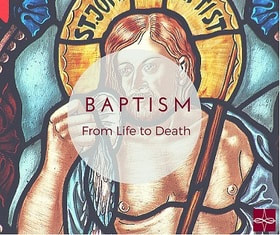

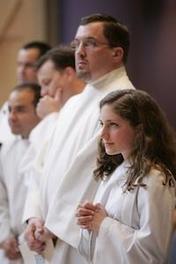


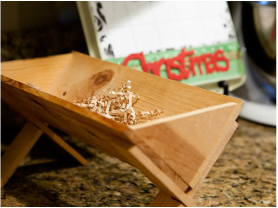




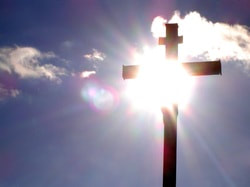
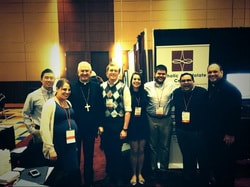


 RSS Feed
RSS Feed